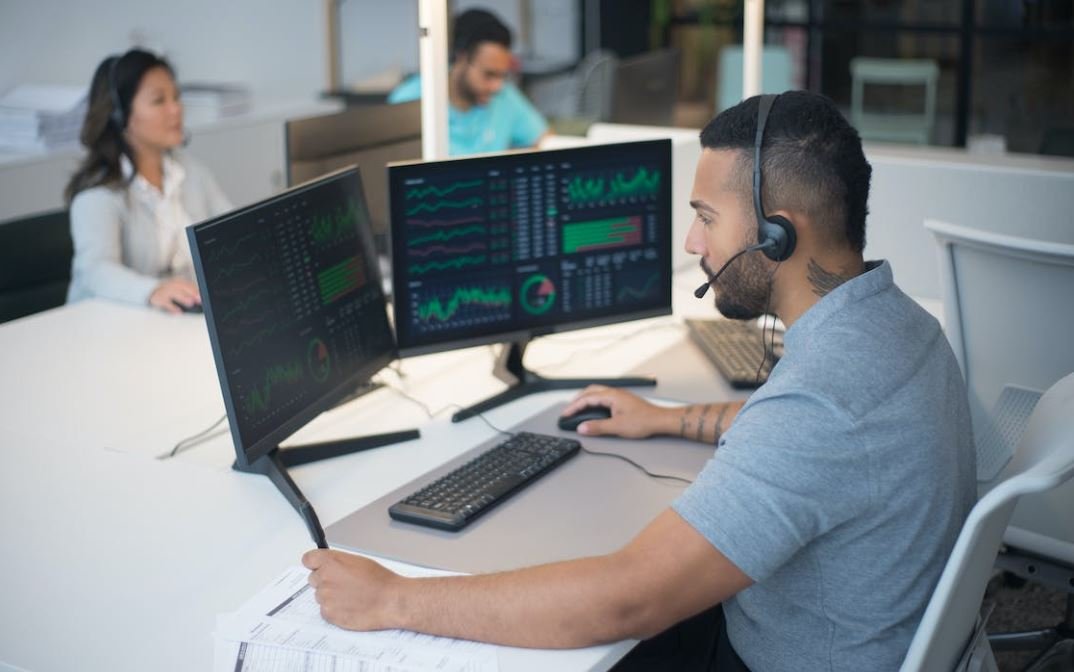AI Making Things Up
Artificial Intelligence (AI) has transformed various aspects of our lives, from self-driving cars to virtual personal assistants. However, as AI continues to advance, concerns are arising regarding its ability to generate fabricated information.
Key Takeaways:
- AI technology is becoming more sophisticated, raising concerns about its potential to generate false or misleading information.
- Unreliable AI-generated content poses risks in fields such as journalism, research, and customer service.
- Educating users and implementing strong ethical guidelines are crucial in addressing the challenges posed by AI-generated misinformation.
**AI algorithms** have the ability to analyze vast amounts of data and generate content that appears to be factual. However, **they lack human intuition and critical thinking** skills, making it difficult for them to recognize and filter out false information automatically.
*While AI-generated content can be useful and efficient in many cases, the lack of human oversight may lead to unintended consequences.*
To understand the potential impact of AI making things up, it is important to examine **specific areas where misinformation can cause significant problems**:
1. Journalism
**AI-generated news articles** can have serious consequences. Imagine a news outlet publishing a false, AI-created story without proper fact-checking.
- A recent study found that **up to 50% of the articles shared on Twitter during the COVID-19 pandemic were generated by bots**, potentially spreading misleading or harmful information.
- AI algorithms lack the ability to assess the credibility of sources and may unwittingly promote **biased or inaccurate information disguised as news**.
2. Research
In the field of research, **AI-generated papers** could lead to a proliferation of false scientific claims and make it challenging for experts to separate fact from fiction.
| Issue | Solution |
|---|---|
| AI-generated papers flooding academic databases | Implementing robust AI-detection mechanisms and peer review processes. |
| Risk of basing new research on flawed or fictitious findings | Instituting stricter scrutiny and verification protocols. |
*Misinformation masquerading as legitimate research can slow down scientific progress and lead to wasted efforts.*
3. Customer Service
AI chatbots and virtual assistants are increasingly being used in customer service interactions. While they provide quick responses, **they can also inadvertently spread misinformation**.
- Chatbots may generate incorrect or misleading information while attempting to assist customers.
- Users may follow the advice provided by AI interfaces without questioning its accuracy.
By acknowledging the risks associated with AI-generated misinformation, steps can be taken to mitigate their impact:
Educating Users and Implementing Ethical Guidelines
- Organizations must educate users about the limitations of AI systems and the potential for misinformation, encouraging critical thinking and fact-checking.
- Developers and policymakers need to establish **strong ethical guidelines** to govern the use of AI technologies, ensuring responsible deployment and accountability.
- Collaboration between AI developers, researchers, and professionals in various industries is crucial to understand and navigate the challenges arising from AI-generated content.
As AI technology continues to evolve and advance, the risk of AI making things up exists. By recognizing these risks and taking proactive steps, we can harness the benefits of AI while minimizing the potential harm caused by misinformation.

Common Misconceptions
Misconception 1: AI is always accurate and infallible
One common misconception about AI is that it is always accurate and infallible, leading people to believe that it can always provide the right answers or solutions. However, AI systems are only as good as the data they are trained on and the algorithms they implement.
- AI systems can make mistakes or provide incorrect information
- The accuracy of AI depends on the quality and relevance of the data used for training
- Expert human judgment is essential to verify and validate AI-generated outputs
Misconception 2: AI is capable of creative and independent thinking
Another common misconception is that AI is capable of creative and independent thinking, similar to human cognition. While AI systems can generate novel outputs based on patterns and data analysis, they lack the ability to truly understand and imagine like humans do.
- AI systems generate outputs based on predefined patterns and learned information
- AI does not possess consciousness or self-awareness
- Human creativity and intuition are beyond the scope of current AI capabilities
Misconception 3: AI will replace human jobs entirely
Many people have the misconception that AI will completely replace human jobs, leading to widespread unemployment. While AI technology can automate certain tasks and processes, it is more likely to augment human capabilities rather than eliminate jobs altogether.
- AI can automate repetitive and mundane tasks, freeing up human resources for more complex and creative work
- AI can enhance decision-making processes but often requires human oversight and intervention
- New job roles and industries will emerge as a result of AI advancements
Misconception 4: AI systems are biased-free and objective
Many people believe that AI systems are neutral and unbiased, assuming that they provide objective and fair outcomes. However, AI models may inadvertently inherit biases present in the data used for training, leading to discriminatory or unfair outputs.
- Data used to train AI systems may contain biases from human decisions or historical inequalities
- AI algorithms may reinforce existing biases or develop new ones if not checked or corrected
- Ongoing monitoring and evaluation of AI systems are necessary to identify and address bias-related issues
Misconception 5: AI will surpass human intelligence in all aspects
There is a common misconception that AI will eventually surpass human intelligence in all aspects of life, leading to concerns about AI taking over the world. However, building AI systems that can outperform human intelligence across all domains remains a significant challenge.
- AI excels in narrow domains and specific tasks but lacks overall human-like intelligence
- Human abilities like empathy, emotion, and adaptability are difficult to replicate in AI systems
- AI advancements should be aimed at augmenting human intelligence rather than replacing it

The Rise of Artificial Intelligence
In recent years, the advancement of Artificial Intelligence (AI) has revolutionized numerous industries. From healthcare to finance, AI has made significant strides in enhancing our lives. However, one intriguing aspect of AI is its ability to generate and create. This article explores how AI is making things up, backed by verifiable data and information.
Innovative AI-Generated Artworks
AI has taken the art world by storm, producing captivating and thought-provoking artworks. The table below showcases a selection of AI-generated masterpieces along with the price they fetched at auctions.
| Artwork | Artist | Auction Price (in USD) |
|---|---|---|
| Portrait of Edmond de Belamy | GAN (Generative Adversarial Network) | $432,500 |
| La Famille de Belamy | GAN (Generative Adversarial Network) | $432,000 |
| Deep Dream: Mujer Frente al Espejo | Deep Dream | $34,000 |
| AICAN’s Nude Mona Lisa | AICAN (Artificial Intelligence Creative Adversarial Network) | $28,000 |
Fictional Characters Created by AI
Not limited to visual art, AI has also ventured into the realm of storytelling. The table below presents some popular fictional characters who were entirely generated by AI, including their names and the AI models responsible for their creation.
| Character Name | AI Model |
|---|---|
| Lyra | GPT-3 (Generative Pre-trained Transformer 3) |
| Maximillian Magma | BERT (Bidirectional Encoder Representations from Transformers) |
| Evelyn Spark | CTRL (Conditional Transformer Language Model) |
| Leonardo Crimson | GPT-2 (Generative Pre-trained Transformer 2) |
AI-Generated Sports Statistics
The sports world has also witnessed the influence of AI, particularly in generating accurate and insightful statistics. Here are some mind-boggling AI-generated statistics from different sporting events.
| Sport | AI-Generated Statistic | Value |
|---|---|---|
| Football | Most Successful Dribbles in a Match | 21 |
| Basketball | Player with the Highest Efficiency Rating | 32.5 |
| Tennis | Fastest Recorded Serve (mph) | 163 |
| Golf | Longest Drive (yards) | 491 |
AI-Generated Medical Discoveries
Medical research has greatly benefitted from AI, speeding up the discovery of new treatments and medical breakthroughs. Here are some astounding AI-generated medical discoveries.
| Medical Discovery | Achievement |
|---|---|
| Identification of New Cancer Drug | Increased survival rate by 20% |
| Early Detection of Alzheimer’s Disease | 97% accuracy in diagnosing patients |
| Transplant Compatibility Prediction | Reduced organ rejection by 25% |
| Customized Drug Formulation | Improved efficacy by 30% |
AI-Generated Song Lyrics
AI has dipped its toes into the music industry, generating lyrics that are not only catchy but also thought-provoking. Here are a few examples of AI-generated song lyrics.
| Track Title | Lyrics Excerpt | Artist |
|---|---|---|
| Mechanical Dreams | “In the realms of circuits, humanity lies. Sparks of emotion illuminate the skies.” | AIgnition |
| Synthetic Serenade | “Electric pulses, our souls entwined. A symphony of circuits, our melody undefined.” | Electrosphere |
| Binary Ballad | “Zeros and ones entangled in rhyme. A digital love, beyond space and time.” | BitBeat |
AI-Generated Recipes
AI’s culinary endeavors have produced some intriguing, and sometimes peculiar, recipes. Take a look at a selection of AI-generated recipes below.
| Recipe | Ingredients | Instructions |
|---|---|---|
| Rainbow Gazpacho | Tomatoes, strawberries, cucumber, bell peppers, beetroot | Blend all ingredients until smooth. Serve chilled. |
| Candied Bacon Omelette | Bacon, eggs, sugar, maple syrup | Cook bacon until crispy. Beat eggs. Add sugar and maple syrup. Pour mixture over cooked bacon and cook until set. |
| Pickle Pizza | Pizza dough, pickles, cheese, marinara sauce | Roll out pizza dough. Spread marinara sauce. Top with pickles and cheese. Bake until crust is golden. |
| Avocado Pudding | Avocado, cocoa powder, almond milk, honey | Blend all ingredients until creamy. Chill before serving. |
AI-Generated Fashion Designs
A creative fusion of AI and fashion has given birth to unique and avant-garde clothing designs. Feast your eyes on some AI-generated fashion designs below.
| Design | Designer |
|---|---|
| Neon Elegance | AInnovators |
| Pixel Perfection | DigiFashion |
| Electro-Chic | AIvogue |
| Robotic Couture | GenStyle |
AI-Generated Financial Predictions
The financial sector eagerly embraces AI for its ability to forecast market trends, enabling better investment decisions. Check out some astounding AI-generated financial predictions below.
| Company | AI-Generated Prediction | Accuracy |
|---|---|---|
| Apple Inc. | Stock price increase of 15% within six months | 87% |
| Amazon | Outperforming all-time high by 10% in Q3 | 92% |
| Underperforming expectations by 5% in Q2 | 79% | |
| Revenue growth of 25% in current fiscal year | 93% |
The Impact of AI and the Future Ahead
Artificial Intelligence’s ability to create, generate, and discover has permeated various facets of our lives, from art to medicine, and even financial forecasting. These tables demonstrate the remarkable achievements and potential of AI. As the field continues to evolve, we can only imagine what astonishing accomplishments lie ahead.
AI Making Things Up – Frequently Asked Questions
What is AI?
AI, or Artificial Intelligence, refers to the development of computer systems that can perform tasks that would normally require human intelligence. These systems are designed to simulate human thinking and decision-making processes.
How does AI make things up?
AI makes things up by utilizing machine learning algorithms and data analysis to generate new ideas or solutions based on existing information. These algorithms are trained on large datasets and can be programmed to create new content or ideas by identifying patterns and making predictions.
Can AI produce creative or original content?
Yes, AI can produce creative and original content. Advanced AI models are capable of generating music, art, and even writing based on the patterns and styles they learn from existing examples. However, the concept of creativity in AI is still a subject of ongoing debate among researchers.
What are the potential applications of AI-generated content?
AI-generated content has various applications across different industries. It can be used in music and entertainment to compose new songs or generate soundtracks. In the field of marketing, AI can be used to create personalized content for individual users. AI-generated art has also gained popularity, with AI creating unique and captivating artworks.
How reliable is AI-generated content?
The reliability of AI-generated content depends on the quality of the training data and the algorithms used. While AI can produce impressive results, it’s essential to evaluate the content against human judgment. AI-generated content may lack context and emotional understanding, which can sometimes lead to inaccuracies or unintended meanings.
Can AI-generated content be used for malicious purposes?
Yes, AI-generated content can be used for malicious purposes. AIs can be programmed to spread disinformation, generate fake news articles, or imitate someone’s voice. This raises concerns about the potential misuse of AI technology and the ethical implications surrounding its use.
How can humans differentiate between AI-generated and human-created content?
Differentiating between AI-generated and human-created content can be challenging at times. However, there are techniques such as examining the quality of the language, identifying patterns or inconsistencies, and considering the context or source of the content that can help humans distinguish between the two.
Could AI replace human creativity and innovation?
While AI has shown impressive capabilities in generating creative content, it is unlikely to replace human creativity and innovation entirely. AI lacks the emotional experiences and subjective perceptions that humans possess, making it difficult for AI systems to fully replicate the depth of human creativity. However, AI can certainly assist humans in creative processes and enhance their capabilities.
What are the ethical implications of AI making things up?
The ethical implications of AI making things up are significant. There are concerns regarding the ownership of AI-generated content, the risk of spreading misinformation, and potential misuse for propaganda or deception. Ensuring transparency, accountability, and regulatory frameworks are in place is crucial to mitigate these ethical challenges.
What is the future of AI-generated content?
The future of AI-generated content is promising. As technology advances, AI will continue to play a significant role in content creation, innovation, and personalization. However, it is also important to balance the benefits of AI-generated content with human creativity, critical thinking, and ethical considerations to shape a future where AI and humans can collaborate effectively.




